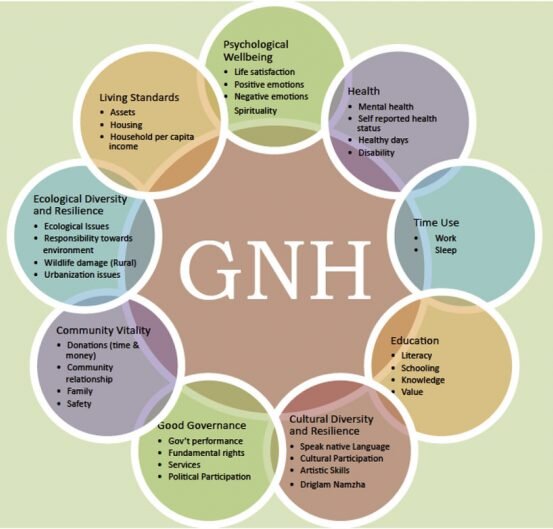
New Zealand is the latest adopter of Gross National Happiness (GNH), bringing hope that Gross Domestic Product (GDP) can soon be dropped as a national index. GDP measures the value of finished goods and services within a country over a specific time frame. A nation’s GDP can then be divided by its population to determine the GDP per capita. This index is used to make assumptions on standards of living within that country.
GNH, or the Happiness Index, is a marker that focuses on the wellbeing of the citizens rather than an economic bottom line. This Index would help governments use their budgets to increase the welfare of its citizens instead of the nation’s Gross Domestic Product.
As an economic tool, GDP only makes assumptions about the basic “average” standards of living, and better standards of living do not necessarily equate to better welfare. Welfare depends on a range of factors such as mental wellbeing, cultural resilience and environmental health. Adopting the Gross National Happiness Index helps governments focus policy and budgeting in a more holistic way, without the predominant tunnel-vision on economic growth.
In 2008 the Kingdom of Bhutan became the first nation to adopt a Gross National Happiness Index. Bhutan started to measure factors including psychological health, living standards, community vitality as well as environmental and cultural resilience, which the government would then use these metrics to inform its policies. New Zealand Prime Minister Jacinda Ardern is the latest leader to adopt the Happiness Index metric, announcing a new budget that focuses on improving the prosperity of local communities. All new spending in New Zealand will advance one of five government priorities:
- improving mental health;
- reducing child poverty;
- addressing the inequalities faced by indigenous people;
- thriving in a digital age;
- transitioning to a low-emission and sustainable economy.
“Sure, we had – and have – GDP growth rates that many other countries around the world envied, but for many New Zealanders, this GDP growth had not translated into higher living standards or better opportunities. How could we be a rockstar, they asked, with homelessness, child poverty and inequality on the rise?”—NZ Finance Minister Grant Robertson
Currently, only Bhutan and New Zealand have adopted a Gross National Happiness Index in their policy-making. If more countries followed suit, it would realign our current pure capitalist mentality with a regenerative economic and political model, one that measures mental health and sustainability to guide their decision-making.













